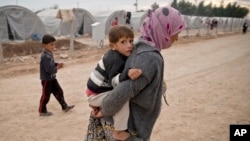For decades, aid groups have assumed they know what's best for refugees and the poor; a growing body of evidence suggests they're wrong.
Both academic research and practical experience, such as with the mass of Syrians fleeing civil war, shows that simply handing out traditional relief goods may not be the most effective way of helping the dispossessed.
Aid agencies are tentatively also giving away cash and letting refugees decide for themselves what they need. While the results may be unexpected, the money is being wisely spent and rarely wasted - contrary to old prejudices among donors.
Lebanon, where one in four residents is a refugee, has offered a lesson that trusting the needy pays off.
Instead of directly supplying blankets and heaters, aid organizations gave cash to thousands of Syrian refugees living in the country's mountains this year in the hope they would spend it on blankets and heaters for the winter. They didn't.
But the money wasn't squandered either. The refugees, among the millions who have escaped the Syrian war, had a better sense than the agencies helping them of what they needed most: they spent the money on food and water.
In the first rigorous evaluation of cash aid to refugees, the International Rescue Committee (IRC) found in Lebanon that the money was not spent in any significant amounts on drugs and cigarettes. Neither did it fund an increase in crime or corruption, which donors had feared would accompany cash aid, or discourage people from working.
Faced with such evidence, some humanitarian organizations are considering a change of tactics. But persuading private and government donors to trust the people they want to help, coupled with the inertia of aid groups themselves which have for decades decided what people need, has slowed cash aid programs.
“There is a tension between people knowing what their own needs are, and the humanitarian sector not being structured in a way that allows people to make their own choices,” said IRC official Radha Rajkotia.
Daniel Masterson, a Yale University academic who conducted the research for IRC, said people who got money from the United Nations and other aid groups were also less likely to do dangerous work, send their children to work, or sell assets such sewing machines which could be used for earning an income.
“Cash recipients also less frequently relied on lower quality foods, skipping meals, or having smaller portions of food,” Masterson said. “There was even an increase in school attendance”
Mistrust
Yet monthly cash payments still account for only three percent of U.N. aid in Lebanon, which has the highest concentration of refugees in the world as a proportion of its population. Worldwide, the bulk of aid is delivered in the form of materials chosen by relief workers, such as tents and blankets.
Humanitarian organizations also worry that donors are less likely to fund cash programs than more traditional aid, where they know exactly what people receive. “Existing organizations operate with a specific mandate. Cash aid cannot be contained,” said Masterson.
IRC's findings in Lebanon are supported by research in Africa and South America. One study found that when $200 was given to drug addicts and petty criminals in the slums of Liberia, they spent it on simple necessities or starting their own legitimate businesses.
Cash aid has another advantage: it's cheaper. Traditional humanitarian work involves huge costs. Items must be procured, transported and handed out, often for long periods. Large staffs are required and people's needs must be regularly reassessed.
By contrast, there are no high transport fees for cash, says Ninette Kelley, representative of the U.N. High Commissioner for Refugees in Lebanon, and agencies can also cut down on storage and distribution costs.
Benefiting the host country
Kelley said that when the U.N. started using cash assistance in 2013, the Lebanese government was worried that Syrian refugees could be better off than poor local people.
Of Syria's 3.2 million refugees, more than a million are in Lebanon. The Beirut government has said it cannot cope with so many and has cut back sharply on numbers allowed into the country. Resentment is also growing among local people who complain that refugees are taking jobs, driving down wages and overloading schools and hospitals.
“We wanted to make sure we were doing no harm through our cash program [and] that it was also providing a benefit to the local Lebanese community, which in fact it does,” Kelley said.
The IRC research found that the refugees spent their cash in the Lebanese communities where they lived. “Another positive impact, you are injecting cash into the economy. You are increasing GDP,” said Masterson.
According to his research, the aid did not increase Lebanese inflation and each dollar of assistance translated into a $2.13 increase in gross domestic product because of extra spending. “We don't need to be scared anymore of cash,” he said.












